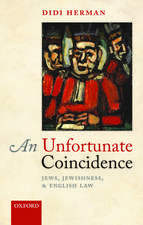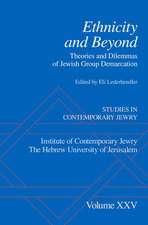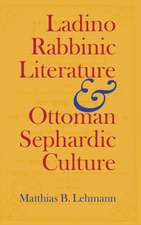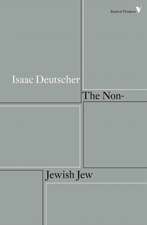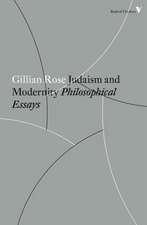The Transformation of German Jewry, 1780-1840
Autor David Sorkinen Limba Engleză Paperback – 31 iul 1999
| Toate formatele și edițiile | Preț | Express |
|---|---|---|
| Paperback (2) | 220.03 lei 43-57 zile | |
| Wayne State University Press – 31 iul 1999 | 220.03 lei 43-57 zile | |
| OUP OXFORD – 25 apr 1991 | 221.32 lei 31-37 zile |
Preț: 220.03 lei
Nou
Puncte Express: 330
Preț estimativ în valută:
42.12€ • 45.76$ • 35.40£
42.12€ • 45.76$ • 35.40£
Carte tipărită la comandă
Livrare economică 21 aprilie-05 mai
Preluare comenzi: 021 569.72.76
Specificații
ISBN-13: 9780814328286
ISBN-10: 0814328288
Pagini: 272
Dimensiuni: 141 x 218 x 17 mm
Greutate: 0.32 kg
Editura: Wayne State University Press
ISBN-10: 0814328288
Pagini: 272
Dimensiuni: 141 x 218 x 17 mm
Greutate: 0.32 kg
Editura: Wayne State University Press
Notă biografică
Descriere
Descriere de la o altă ediție sau format:
In the period from 1780 to 1840 German Jewry underwent a twofold revolution that set the basic patterns of its experience for the century to follow: the end of the Jews's feudal status as an autonomous community forced them to face a protracted process of political and civic emancipation and a far-reaching social metamorphosis, while their encounter with the surrounding culture resulted in an intense productivity. In this groundbreaking study, David Sorkin argues that emancipation and the encounter with German culture and society led not to assimilation but to the creation of a new Jewish identity and community - a vibrant subculture - that produced many of Judaism's modern movements and a pantheon of outstanding writers, artists, composers, scientists, and academics.
In the period from 1780 to 1840 German Jewry underwent a twofold revolution that set the basic patterns of its experience for the century to follow: the end of the Jews's feudal status as an autonomous community forced them to face a protracted process of political and civic emancipation and a far-reaching social metamorphosis, while their encounter with the surrounding culture resulted in an intense productivity. In this groundbreaking study, David Sorkin argues that emancipation and the encounter with German culture and society led not to assimilation but to the creation of a new Jewish identity and community - a vibrant subculture - that produced many of Judaism's modern movements and a pantheon of outstanding writers, artists, composers, scientists, and academics.
Recenzii
`certainly the subtlest account of the "German-Jewish symbiosis" that has hitherto been offered ... Sorkin succeeds admirably in clarifying the ironies of partial assimilation and in providing a fuller intellectual context than was previously available for the development of the German-Jewish identity.'German History
David Sorkin's important and much-praised book, first published in 1987 and now reissued in paperback, explores in great detail how emancipatory legislation caused the German Jewish community to change its character and yet to remain distinct ... According to the ideology of emancipation, they should have merged with the German bourgeoisie. But they did not, and Sorkin's original contribution is to demonstrate this failure in massive but lucidly controlled detail.
David Sorkin's important and much-praised book, first published in 1987 and now reissued in paperback, explores in great detail how emancipatory legislation caused the German Jewish community to change its character and yet to remain distinct ... According to the ideology of emancipation, they should have merged with the German bourgeoisie. But they did not, and Sorkin's original contribution is to demonstrate this failure in massive but lucidly controlled detail.



